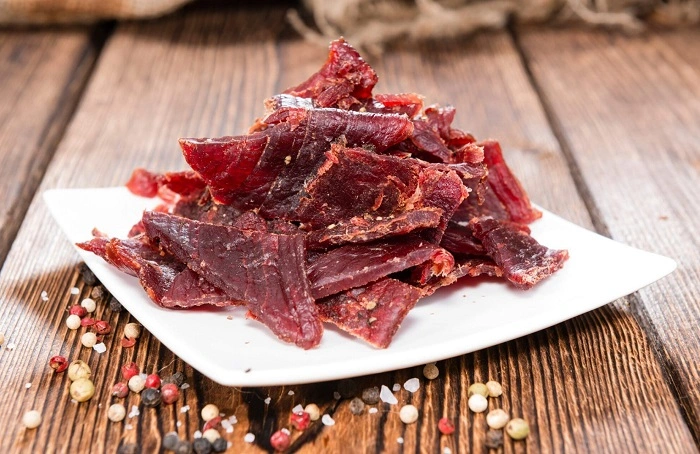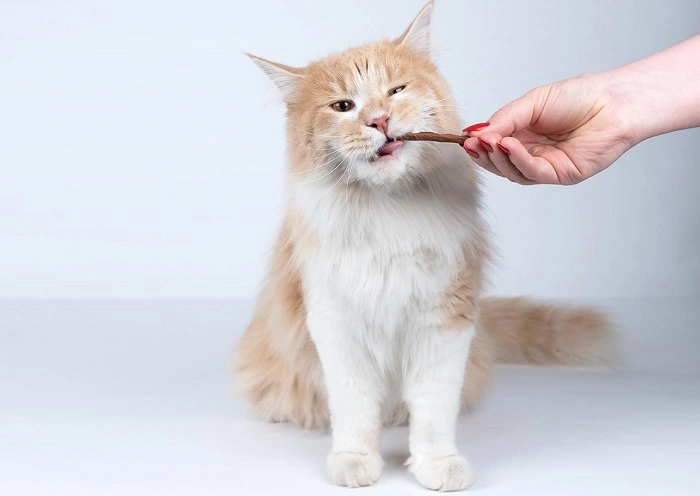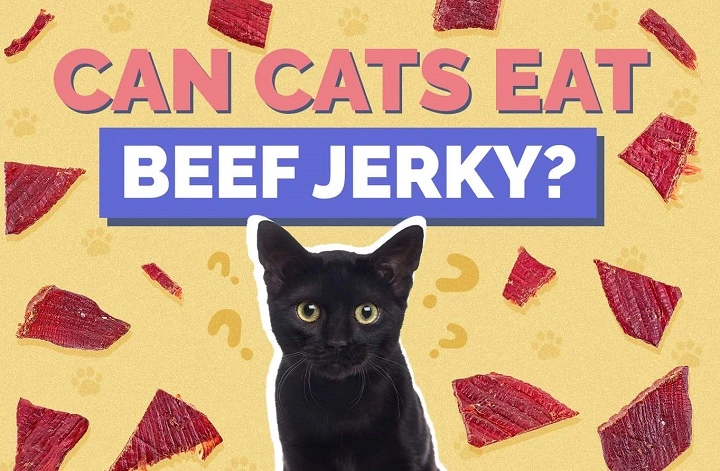Beef jerky is a tasty, protein-packed snack that many humans enjoy on the go. If you’ve ever caught your cat sniffing around your jerky or trying to sneak a bite, you may wonder—can cats eat beef jerky? While the base ingredient is meat, which cats typically thrive on, the answer is more complicated. Not all meats are created equal when it comes to feline health.
This guide breaks down everything cat owners need to know about beef jerky, its potential dangers, and what safer alternatives you can give your pet instead.
What Is Beef Jerky and What Does It Contain?

Beef jerky is made by curing meat with salt and then drying it. Most commercial versions also include:
- Added sugars
- Salt or soy sauce
- Garlic and onion powder
- Pepper, chili flakes, or other spices
- Preservatives such as sodium nitrite or BHA
While this combination is tasty and safe for people in small amounts, it poses several issues when it comes to feline health.
Is Beef Jerky Safe for Cats?
The short answer is no. Beef jerky is not considered a safe treat for cats due to its ingredients and preparation methods. Even though cats are obligate carnivores, which means they rely on meat for survival, processed meats like jerky can cause more harm than good.
A small bite may not be immediately toxic, but regular consumption or a large amount can lead to serious health issues.
Why Beef Jerky Is Dangerous for Cats
High Sodium Content
Beef jerky is extremely salty. Cats have very low sodium tolerance, and consuming salty foods can lead to dehydration, increased thirst, and potentially salt poisoning. Symptoms of salt toxicity in cats include vomiting, lethargy, loss of appetite, tremors, or even seizures.
Harmful Spices and Seasonings
Most jerky contains garlic powder and onion powder, both of which are toxic to cats. These ingredients can damage red blood cells and lead to hemolytic anemia. Even in small amounts, regular exposure can cause long-term damage.
Spicy ingredients like chili flakes or black pepper can also irritate your cat’s digestive system, causing vomiting or diarrhea.
Tough Texture and Choking Hazards
Beef jerky has a chewy, fibrous texture that can be difficult for cats to chew or swallow properly. This makes it a choking risk, especially for small cats or kittens. It can also cause gastrointestinal blockages if swallowed in large chunks.
Preservatives and Artificial Additives
Preservatives like BHA and BHT are commonly found in jerky and have been linked to potential health risks in animals. These additives can disrupt your cat’s digestion or liver function over time. Artificial flavoring agents may also cause allergic reactions or upset stomachs.
What Happens If a Cat Eats Beef Jerky?
If your cat manages to eat a small piece of jerky, it might not require an emergency vet visit, but you should monitor them for symptoms. The severity will depend on the ingredients and how much they consumed.
Watch for:
- Vomiting
- Diarrhea
- Drooling
- Excessive thirst
- Weakness or fatigue
- Loss of appetite
If your cat consumed jerky with garlic or onion powder, or if they ate a significant amount, call your veterinarian immediately. Even seemingly mild reactions can become serious if left untreated.
Are Any Types of Jerky Safe?
While most jerky made for humans is unsafe, there are some jerky-style treats formulated specifically for cats. These products are free from toxic seasonings, have controlled sodium levels, and often include added taurine, which is essential for feline health.
Always read the ingredient list carefully and choose products from reputable pet food brands that cater to feline dietary needs.
Homemade Jerky: A Safer Option?
If you’re comfortable in the kitchen, you can make a homemade version of jerky using plain, lean beef or chicken without any salt, oil, or spices. Simply bake thinly sliced meat at a low temperature until fully dried. Let it cool and cut it into small pieces suitable for your cat.
Even homemade jerky should only be given as an occasional treat, not as a regular part of your cat’s diet.
Healthier and Safer Alternatives to Beef Jerky

If you’re looking to reward your cat with something protein-rich and tasty, consider the following healthier options:
- Boiled or steamed plain chicken breast
- Cooked lean turkey
- Freeze-dried cat treats made with a single meat source
- Cooked, boneless fish like salmon or tuna (only in moderation)
- Commercially prepared cat jerky or chewy treats with no added preservatives
These options are more appropriate for a cat’s digestive system and free of dangerous additives.
Why Cats Might Be Attracted to Jerky
Cats are naturally drawn to strong-smelling, meat-based foods. Beef jerky’s intense aroma, chewy texture, and salty flavor may be appealing, but that doesn’t mean it’s good for them.
Never assume your cat’s interest in a food means it’s safe. Many toxic foods smell and taste good to animals but can cause serious health problems.
How to Prevent Your Cat From Eating Beef Jerky
To keep your cat safe, use these simple tips:
- Store jerky in sealed containers out of reach
- Avoid leaving snack bags open on tables or counters
- Train family members not to feed cats human food
- Provide appealing, safe treats specifically made for cats
- Redirect food curiosity with toys or catnip
It’s always better to be proactive and prevent access than to deal with a potential emergency later.
FAQs About Cats and Beef Jerky
Can cats eat plain beef jerky without seasoning?
Even plain jerky is risky due to high sodium levels and tough texture. If it’s not made specifically for cats, it’s best avoided.
What should I do if my cat eats a piece of jerky?
Watch for any symptoms like vomiting, diarrhea, or lethargy. If the jerky contained garlic, onion, or a lot of salt, call your veterinarian immediately.
Are there jerky treats made just for cats?
Yes, some pet food companies offer jerky-style treats made from single-source meat and formulated to be safe for cats. Always check the label.
How often can I give my cat meat treats?
Only occasionally and in small portions. Treats should make up no more than 10 percent of your cat’s daily calorie intake.
Can beef jerky cause long-term health issues in cats?
Frequent exposure to salt, spices, and preservatives in jerky can lead to chronic health issues like kidney strain or anemia. It’s best to avoid it entirely.




